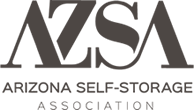Complete Story
01/27/2018
Protect Your Facility from Illegal Activity
By Anne Mari DeCoster
AZSA Executive Director
At the January 23 Educational Workshop in Yuma, Detective Rick Keeling, Arizona Department of Public Safety, and DEA Agent Tom Coney helped AZSA members learn how to spot illegal activity on their properties. Their overall guidance:
You know what’s normal, so focus on what’s not normal.
And follow the advice of Carol Mixon-Krendl, owner of SkilCheck Services. In many of her presentations to self-storage operators, Carol advises that if a prospect’s behavior makes you suspicious, don’t rent to them. It is better to say no to a rental than to end up with a problem tenant.
Detective Keeling and Agent Coney gave a laundry list of signs to watch out for among prospects and tenants:
- Nervous behavior, sweating excessively, and/or evasive in answering questions in the rental process;
- Leasing a unit for someone else;
- Leasing a unit far from the address provided, without a reasonable explanation (i.e., snowbirds, gem show, etc.);
- No ID;
- Seeking 24-hour access;
- Asking questions about surveillance camera location and other security features;
- Seeking out-of-the-way space, far from office, facility entrance, heavier traffic areas;
- Paying in cash;
- Paying in advance;
- Unusual objects being stored, including heat sealers, money counters, digital scales, “growing units” (approximately 1’x1’x2’ cubic corner units for growing marijuana – and any other plant);
- Secretive behavior, such as avoiding staff or closing the door of the unit when accessing it;
- Short, frequent visits to unit;
- Visits to unit by people not on the lease;
- Assembly or disassembly sounds coming from unit;
- Bad or unusual odors, including urine, chemicals, oil or transmission fluid, masking agents such as fragrance or fabric softener;
- Use of electricity in unit;
- Use of air conditioning units, hydroponic lights, heat lamps, ventilation, LED lights, fans, or generators, growing units;
- Unusual garbage in your dumpster, including PVC pipes, soil, halogen bulbs, camp fuel, paint thinner, acetone, spray cans, lithium batteries, Drano, brake fluid.
DEA & DPS suggestions to keep your facility crime-free:
- While someone is renting a unit, quickly Google the address provided to see if it is a residence; if not, inquire further, remembering Carol Mixon-Krendl’s advice not to rent the space if you observe suspicious behavior;
- Also during the rental process, call the phone number provided to see if it is a working number and if it rings on their phone; if not, ask for another number, ask more questions, and don’t hesitate to stop the rental process if you are suspicious;
- Mail new tenants a welcome card using the address provided; if it is not deliverable, overlock the unit and/or lock out the gate code until a working mailing address is provided;
- Lock dumpsters;
- Maintain surveillance cameras;
- Make sure on-site lighting is adequate, both as a deterrent to crime and other unwanted behavior, and so that cameras can capture all activity;
- Position cameras carefully and test to make sure you can see what is being recorded;
- Save any surveillance video that is not normal;
- Document anything that is not normal, with time, date, description, and photos; use AZSA’s Incident Report (found in the Members Area of the website); this provides a starting point for an investigation;
- When calling local law enforcement for help, ask that a detective be assigned, not just a police officer on duty;
- Invite local law enforcement to use your facility to train their drug-sniffing dogs, and post signs to that effect on-site;
- Do not touch or inhale anything suspicious: white powder, fluids, etc.
- Remember: if you use the AZSA lease, you as the operator have the right to enter and inspect the unit and its contents at any time, for any reasonable purpose – yet another good reason to use the AZSA lease.
Other resources to check out:
- DEA Drug Fact Sheets: https://www.dea.gov/druginfo/factsheets.shtml
- Online Tip Submission: https://www.dea.gov/ops/submit.php
- Arizona DEA offices: https://www.dea.gov/about/Domesticoffices.shtml

